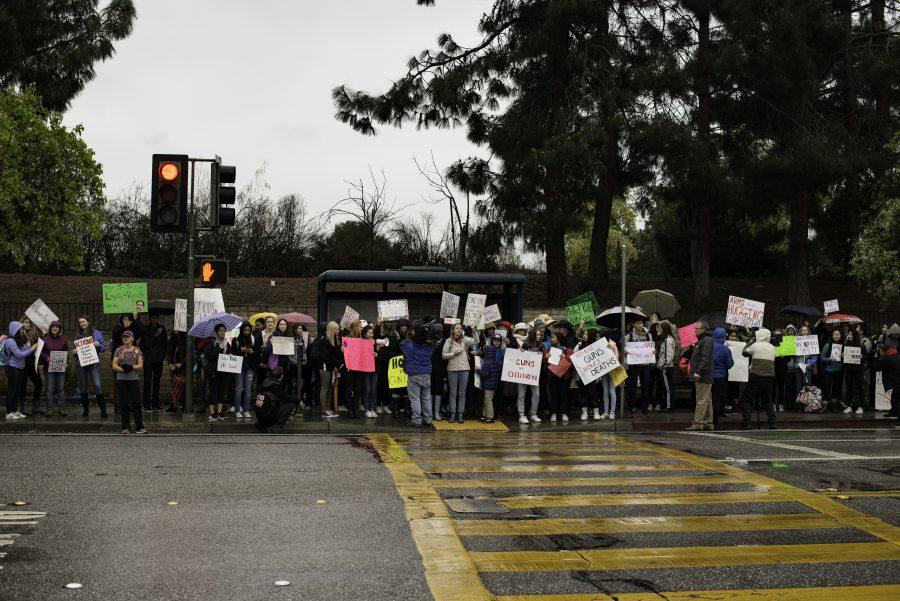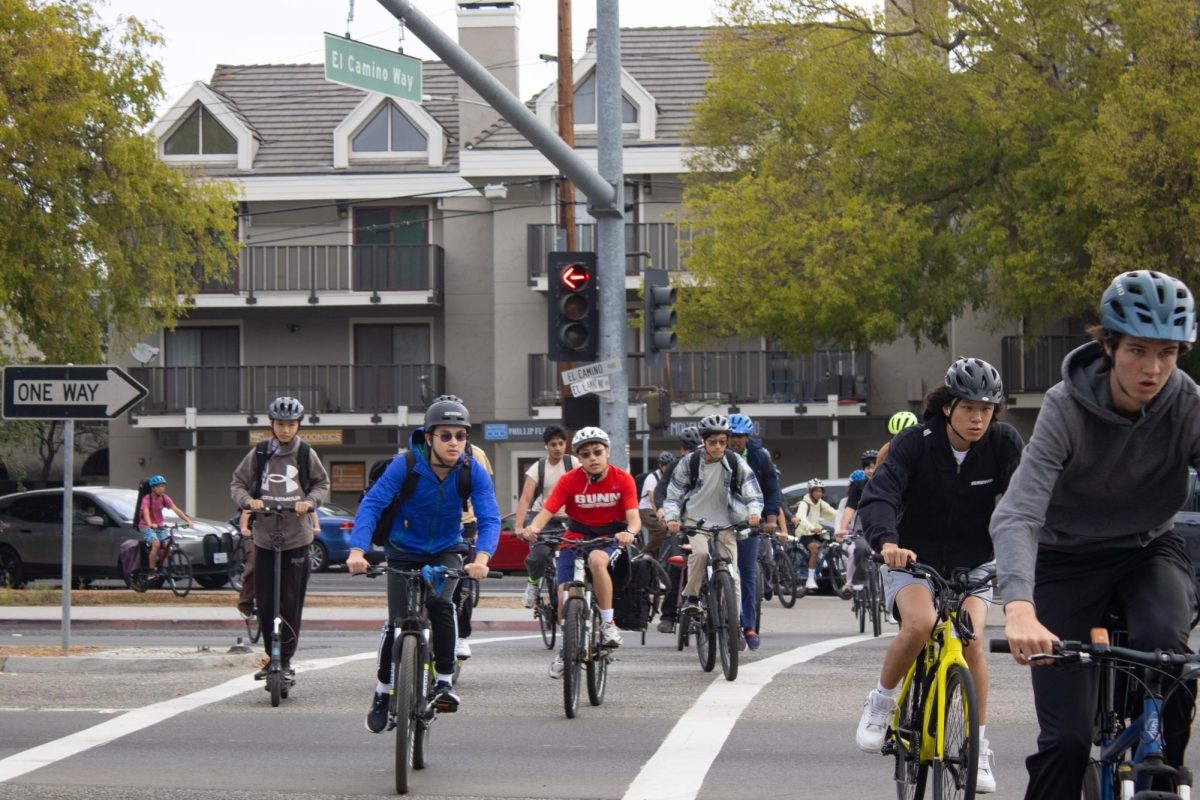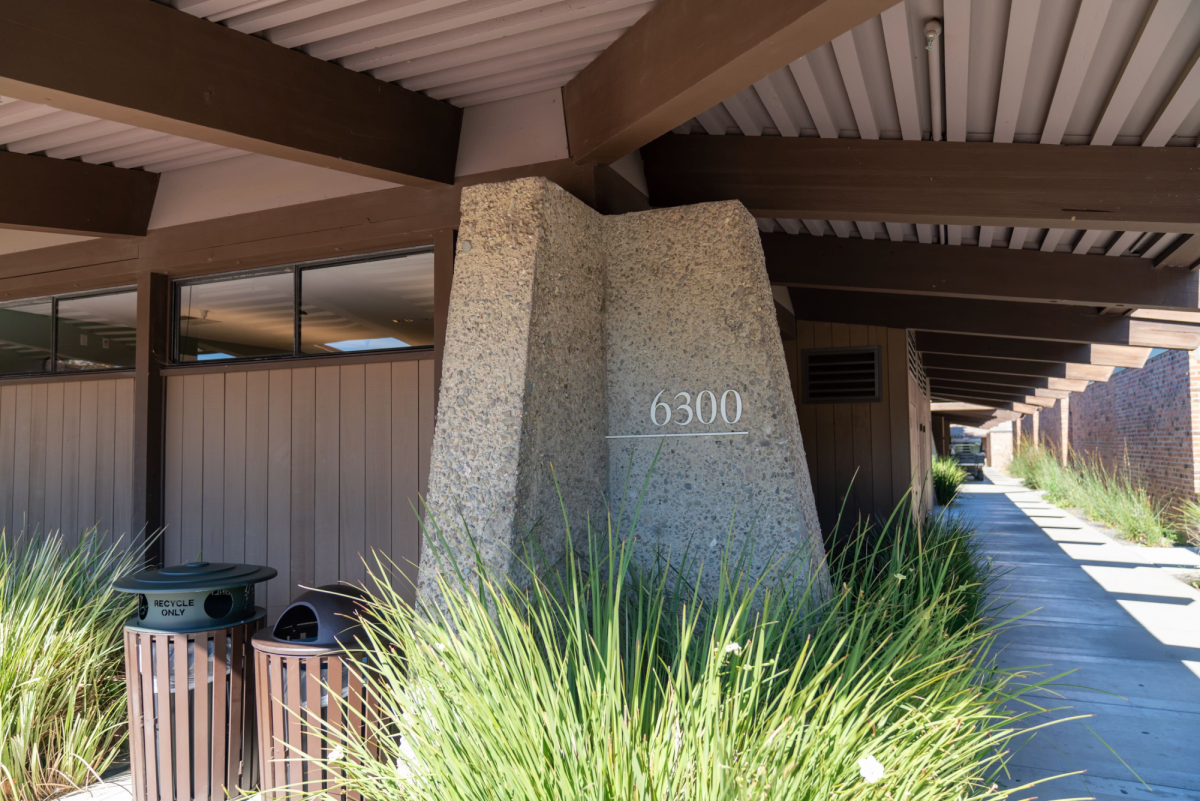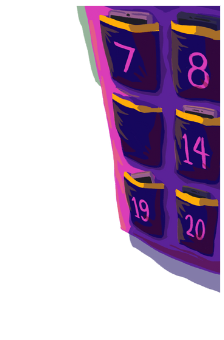Written by Janet Wang
On Feb. 26, over 100 Gunn students and community members rallied before the start of school, chanting the slogan, “Gunn students for gun control” and holding signs with sayings such as “Remove guns, reduce deaths” and “Honk for gun control.” The group cheered as cars drove by, honking in support, and despite the heavy rainfall stood in solidarity as part of the nation-wide response to the Feb. 14 school shooting at Marjory Stoneman Douglas High School in Parkland, Florida.
Since the Parkland shooting, in which 17 students lost their lives, students across the country have been walking out and rallying in protest, calling for stricter gun laws and for political leaders to take action. This call for action has quickly spread across the country to the Bay Area, where students from Encinal High School in Alameda to Mountain View High School have begun to step up in solidarity for the cause.
When junior Elizabeth Salwitz heard about the Parkland shooting, she was saddened but not completely surprised. “It’s such a common thing in our society now, and the fact that it could not surprise people now is incredible,” she said. “It feels like it’s just something that happens in our society, and that’s something that is really messed up.” After seeing other students around the country take a stand, Salwitz decided that it was time to carry the movement to Gunn.
Salwitz gathered a few of her friends and started organizing the event, naming the rally #NeverAgain Gunn High School, according to their Facebook event. Despite seeing bigger movements organized in March and April, Salwitz emphasized the importance of taking immediate action. “I think a lot of people were saying that we should wait until then, but I’m thinking that we can’t just wait to push it back,” she said. “In our society, we have the right to life, liberty, and the pursuit of happiness, but if [there is] somebody else who is using their Second Amendment to take away those rights, it just doesn’t make sense to me how we could just be letting this happen and not do anything about it.”
For freshman Nicholas Ferguson, who attended the protest, the Parkland shooting put the reality of school shootings into perspective. “I decided it was time to change,” he said. “That could have been us, and we could have been the ones shot, and I don’t want that to happen. [The protest] gives me hope that people are willing to get up this early in the morning and protest something that really matters.”
Senior Colin Dyson heard about the event on Facebook, and ultimately decided to come support student voice. “I believe that there has to be change, and since we’re students, we don’t really have a say except for our voice,” he said. “Everyone lined up across the street, and everyone was walking into the protest, and just hearing everyone honk for agreement was definitely something that was good to hear, especially for us students.”
The emphasis on student voice and student-led initiatives have been increasingly prevalent recently, though youth have been taking a influential stance since the Civil Rights movement, according to The Atlantic. In 1960, four African American students from North Carolina A&T State University initiated the Greensboro Lunch Counter sit-ins, a movement that gained support to protest segregation at restaurants and sparked other civil rights movements across the country.
Similarly today, student activism has been a critical part of calling for change in the Black Lives Matter movement, Women’s March and now, gun control reform. A week after the Stoneman Douglas shooting, a group called the Teens for Gun Reform, organized by high school juniors Whitney Bowen and Eleanor Nuechterlein, staged a lie-in outside the White House in Washington D.C.
According to the Teens for Gun Reform Facebook page, the lie-in was a protest to “stand together in solidarity as the younger generations, and show our legislator that we demand reform in order to feel safer in our classrooms.” For John Salwitz, a Gunn parent who came to support his daughter, Elizabeth, it is important for students to take part in initiatives that affect them. “I think [students] got the most to gain by change and represent maybe a new voice that we need right now,” he said. According to John Salwitz, students who voice their concerns may influence their parents’ decisions, perhaps influencing them to rethink guns in society.
Gunn parent Hayyah Muller agrees, adding that the power of student voice can sometimes outweigh the policies of political leaders. “There is a literal epidemic of death by guns in the U.S.,” she said. “The mass shootings in schools and churches have caught people’s attention and have begun to terrify parents and community members. To see people gathering to protest and kids themselves advocating for change hopefully means that the political justifications for inaction won’t hold their weight anymore.”
As students start approaching legal voting age, Elizabeth Salwitz says that though protesting is effective, students should register to vote to influence tangible change in the future. “Even if you protest and say that things are right, you’re saying that you have a problem with it, but you’re not acting on it and voting,” she said. “Even if you protest and say that things are right, you’re saying that you have a problem with it but you’re not acting on it and voting.”
Ultimately, parents, students and community members share the same hopes for the future: reform gun laws and reduce gun-related deaths. Salwitz, along with others, believes that there should be stricter gun laws and gun accessibility. “I don’t think that people can just be able to walk into some store and buy a gun because that’s basically what the shooter from Florida did,” she said. “There are a lot of people saying that you need a good guy with a gun to take out a bad guy with a gun, but if the bad guy didn’t have the gun in the first place, you wouldn’t need to worry about that.”
Muller hopes that though the gun reform movement has turned into a political issue, it is important to keep in mind the lives at stake.“In recent years, after each mass gun violence tragedy, our attempts to begin a discussion about gun regulation have been labeled as ‘politicizing tragedy,’” she said. “I think we are beginning to understand that this is not an issue of politics or where each person lies on the political spectrum. This is a issue of life and death for our children and of what it means to live in America.”





















